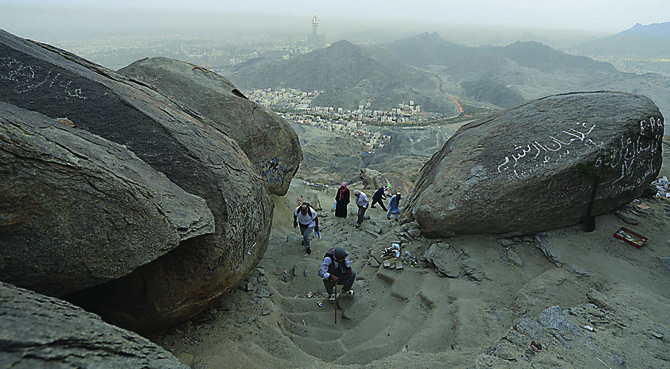JEDDAH: During the pilgrimages of Hajj and Umrah, devout Muslims seek out sites that deepen their understanding of Islam and its rich heritage.
The historical sites and archaeological museums in Makkah Al-Mukarramah and Madinah Al-Munawara offer a profound educational experience to millions of visitors from around the world who flock to the two holy cities each year.
After completing their religious rites, such as Umrah and Tawaf, and paying their respects at the Haram, pilgrims yearn to immerse themselves in the history of Makkah and Madinah.
With histories going back thousands of years, these cities are embodiments of the origins of Islamic culture, having welcomed pilgrims down the ages and developed a distinct cultural identity in the process of doing so.
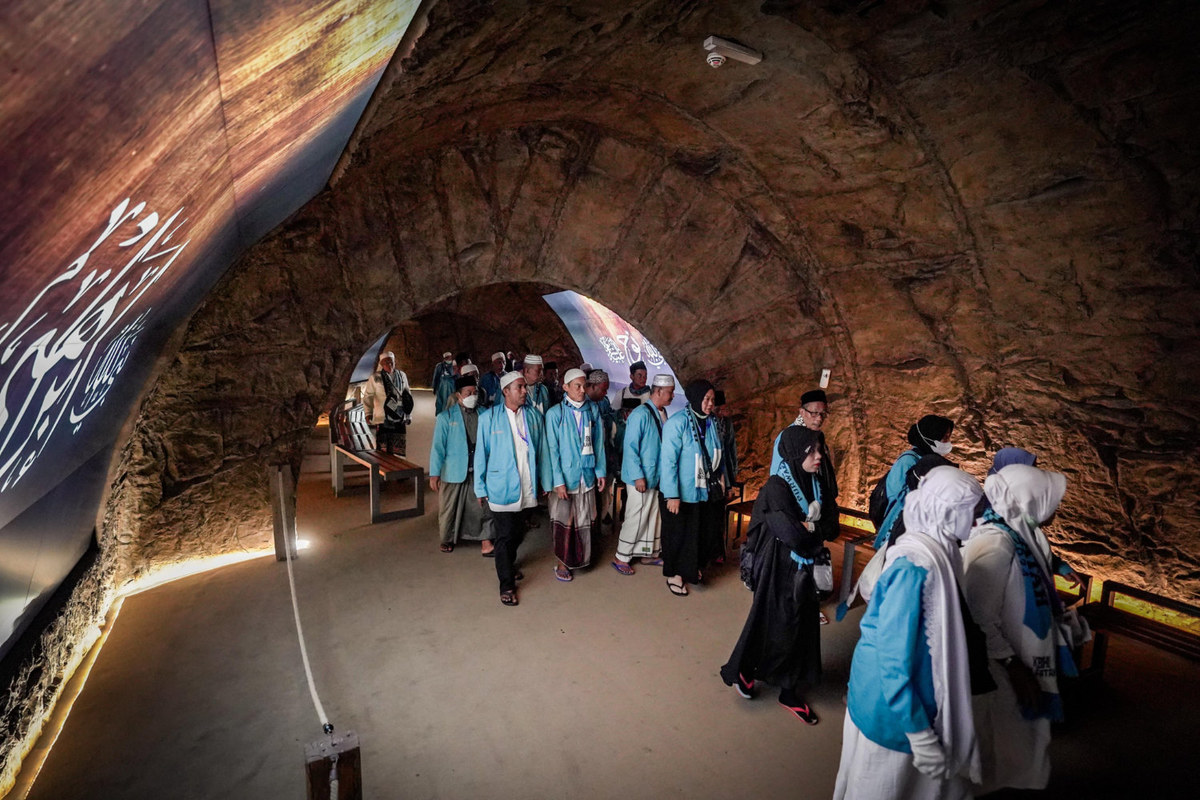
The Hira Cultural District in Makkah is among the must-visit landmarks for pilgrims. (SPA)
To grasp the historical importance of these cities and gain a deeper insight into their religious significance, visitors are urged to venture beyond the well-known landmarks like Jannat Ul Mua’lla, the Cave of Hira in Jabal Al-Nour, Mount Arafat and Masjid-e-Ayesha.
Nestled beside the renowned Jabal Al-Nour, the Hira Cultural District offers a distinctive fusion of cultural, historical, and engaging encounters. Encompassing 67,000 square meters, this district offers pilgrims an immersive voyage through time, enabling them to forge a connection with the vibrant history of Makkah.
Near the Haram lies the historic site of Hudaibiyah, where Prophet Muhammad signed the crucial treaty of Hudaibiyah. A mosque now stands at the site, alongside a weathered structure of unknown origin.
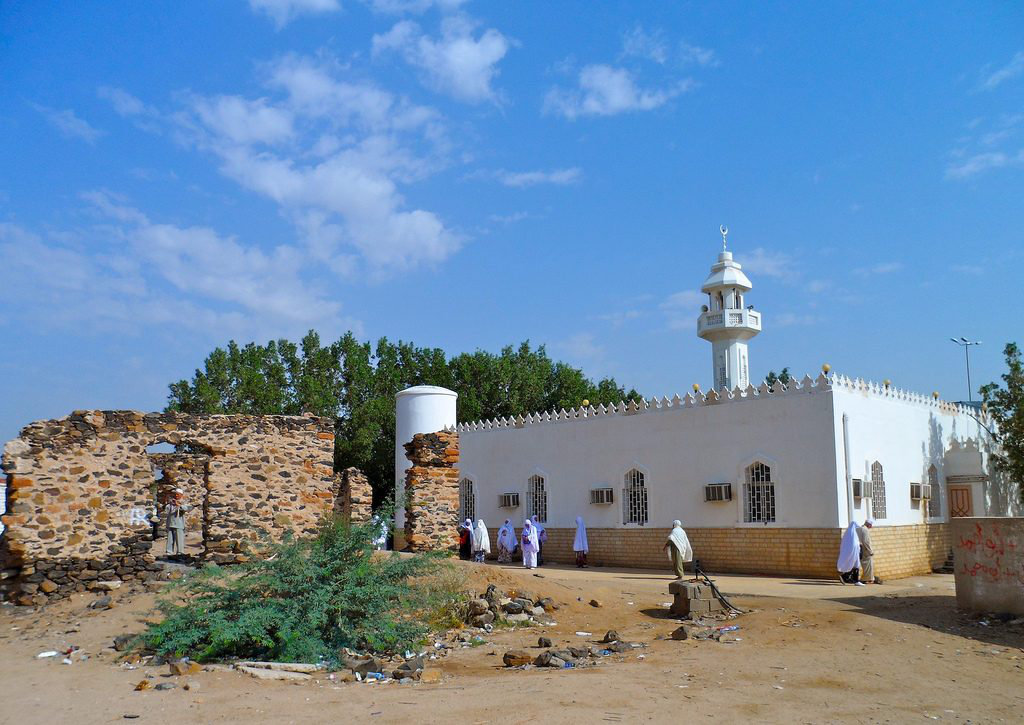
A mosque now stands in the historic site of Hudaibiyah, where Prophet Muhammad signed the crucial treaty of Hudaibiyah. (Supplied)
In 809, during a time of extreme water scarcity in Makkah, Queen Zubaida, the wife of Abbasid Caliph Harun Rashid, undertook a pilgrimage to the holy city. Witnessing the challenging conditions faced by pilgrims, she took immediate action by ordering the construction of the Zubaida Canal.
This canal, built more than a thousand years ago, has continued to supply water to pilgrims visiting Makkah ever since.
Lastly, Mount Abu Qubais, where a miraculous event involving the moon occurred, serves as a reminder of divine intervention in Makkah’s scenery.
One of the must-visit attractions in Makkah is the Assalaamu Aleyka Ayyuhan Nabiyyu Museum, which educates visitors about the life of Prophet Muhammad through innovative displays and artifacts.
By providing glimpses into the type of dwelling he may have inhabited and showcasing clothing from his era, the museum offers a unique insight into his life, allowing guests to delve into the lives of his ancestors, wives, children, and descendants.
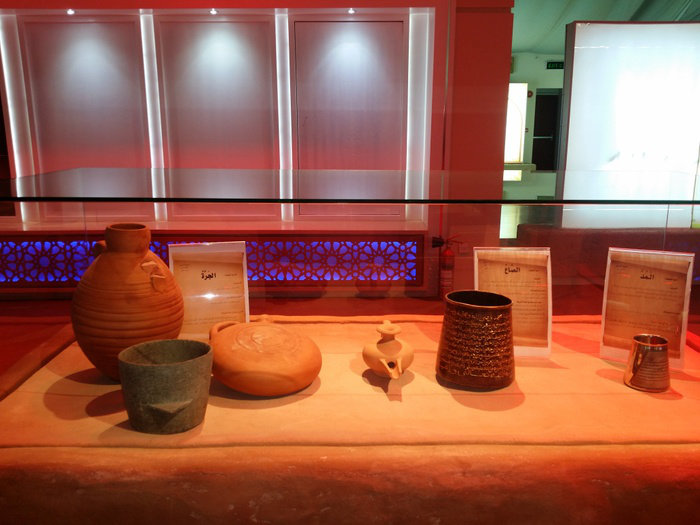
The Assalaamu Aleyka Ayyuhan Nabiyyu Museum in Makkah. (Supplied)
The collaborative effort of more than 150 scholars ensures the museum’s authenticity in religious, and archaeological details, creating a comprehensive and accurate portrayal of Prophet Muhammad’s life and legacy.
“I have been guiding pilgrims on deeply spiritual journeys for nearly 15 years, introducing them to the holy city’s lesser-known treasures,” Ahmed Khan, a private tour guide, told Arab News.
“Pilgrims are always thrilled and grateful when we visit sites where the legacy of Prophet Muhammad and the rich heritage of Islam resonate with each step.”
Another private tour guide, Aman Javaid, emphasized the importance of providing pilgrims with accurate information about the sites they visit.
“It’s crucial for me to ensure that I share all the correct details about these places,” he told Arab News. “Many pilgrims often mention the Cave of Hira, but I make it a point to take them to the Cave of Thawr as well.
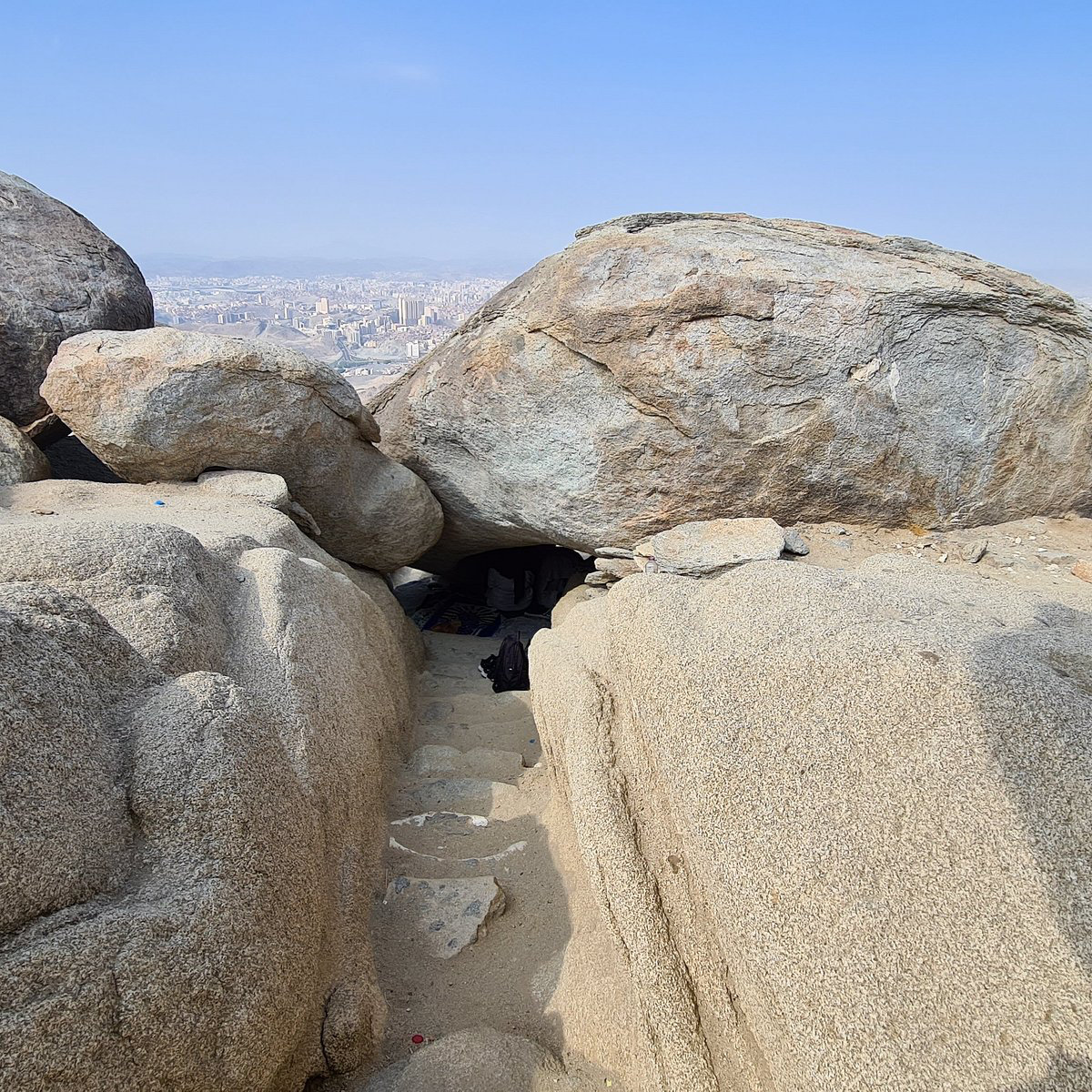
The Thawr Cave, located in the Jabal Thawr mopuntain, is the place where Prophet Muhammad (PBUH) and his companion Abu Bakr hid from the Quraysh during the migration to Madinah. (Supplied)
“This revered site is where the Prophet Muhammad and his companion Abu Bakr sought refuge during their migration to Madinah. Sharing the story of how they escaped their enemies and found solace there always piques the pilgrims’ interest. I make sure I have comprehensive knowledge about these sacred sites.”
The Cave of Thawr underscores the importance of seeking refuge and divine guidance during adversity, marking a pivotal moment in Islamic history. Pilgrims honor the legacy of the prophet and Abu Bakr by offering prayers and paying their respects in this sacred place.
Located at the birthplace of Prophet Muhammad, the Makkah Al-Mukarramah Library serves as a hub for knowledge and research. With a collection of more than 350,000 rare books and manuscripts, this esteemed institution stands as a testament to Makkah’s cultural and intellectual heritage.
Within the King Abdulaziz Complex lies the renowned Kiswa Factory, where artisans annually produce the exquisite black silk coverings for the Holy Kaaba. Adorned with intricate silver and gold embroidery and Quranic inscriptions, these coverings are a symbol of reverence and tradition.
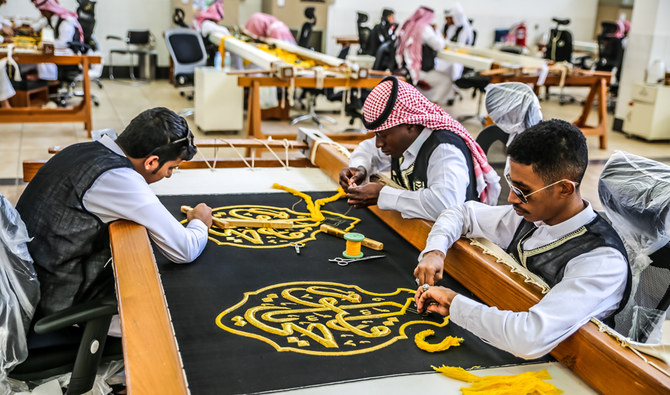
Inside the King Abdul Aziz Complex, workers fabricate the kiswa, the cover of the Holy Kaaba. (AN photo/File)
The factory, now known as the King Abdulaziz Complex for Kiswa, showcases the artistry of silk knitting and embroidery, preserving a centuries-old craft.
Madinah, as the second holiest city in Islam, holds immense importance for Muslims undertaking Umrah and Hajj pilgrimages. Pilgrims visit to pay their respects at renowned mosques and historical sites steeped in cultural and religious significance.
The city is home to historic mosques dating back to the time of Prophet Muhammad, offering a spiritually enriching experience.
Masjid Al-Qiblatain stands out with its traditional design and renowned twin mihrabs, where it is believed Prophet Muhammad received a divine command to change the qibla direction. Rebuilt during King Fahd’s reign, this mosque remains a beautiful and significant place for prayers in Madinah.
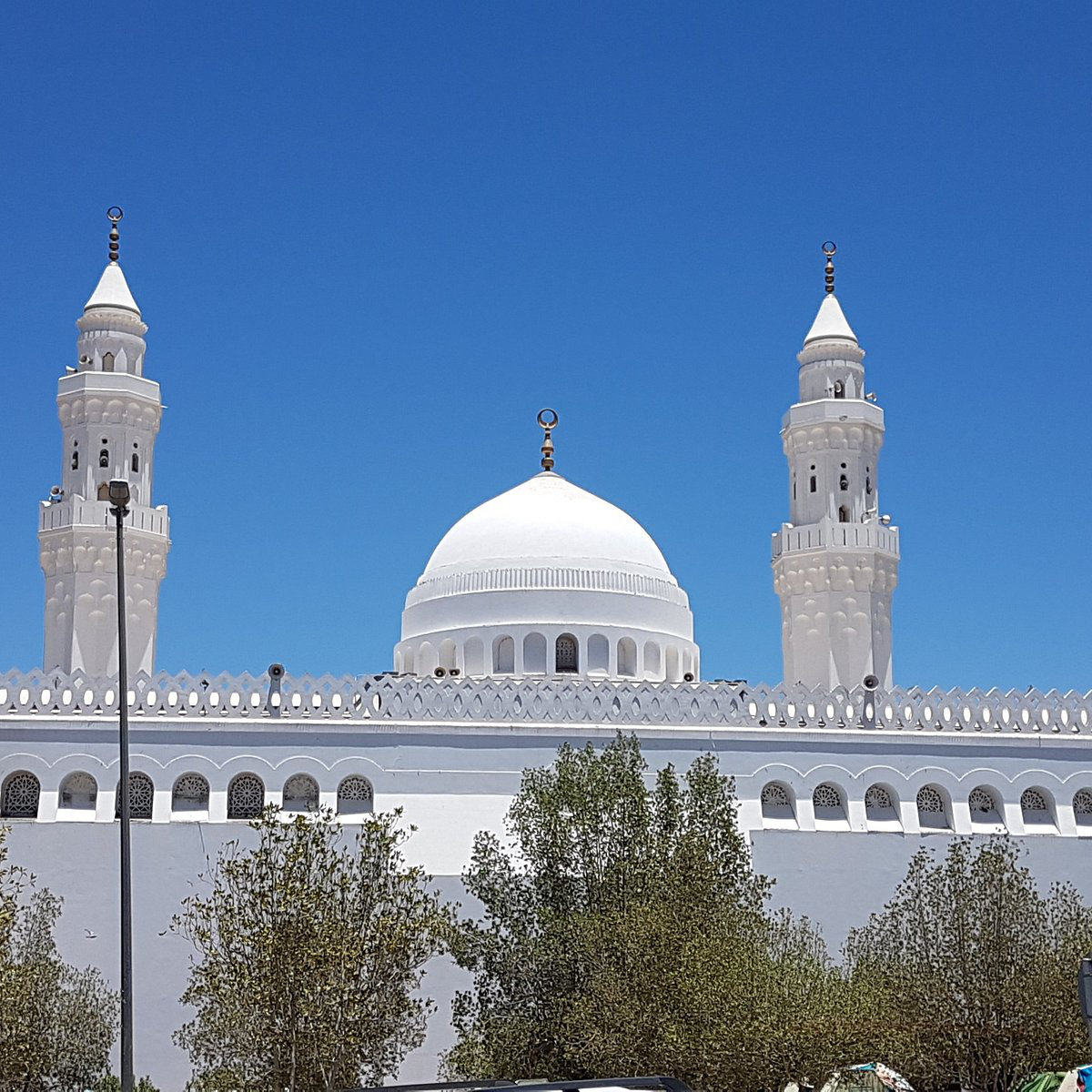
Masjid Al-Qiblatain, meaning “two directions,” was built two years after Prophet Mohammed arrived in Madinah, a city known for its rich Islamic history, and a customary stop for millions of Umrah and Hajj pilgrims every year. (SPA)
Another notable site is Masjid Abu Bakr, honoring the first caliph and close companion of the prophet, reflecting the deep bond between Abu Bakr and Prophet Muhammad through its modest yet serene setting and inviting visitors to draw inspiration from Abu Bakr’s unwavering faith.
Among the historic mosques in Madinah, Masjid Al-Ahzab holds a significant place in Islamic culture, marking the site of a pivotal battle where the prophet’s du’a led to victory.
Meanwhile, Masjid Al-Ghamamah, though small in size, remains an important site for seeking blessings during ziyarat in Madinah. Visitors are encouraged to respect the mosque’s guidelines, including observing prayer times and maintaining modesty, to fully appreciate the spiritual significance of these revered locations.
Another fascinating site relates to the Battle of the Trench, also known as the Khandak Battle — a significant military confrontation in 624 between the Muslims of Madinah and the Makkan army, which was attempting to suppress the spread of Islam.
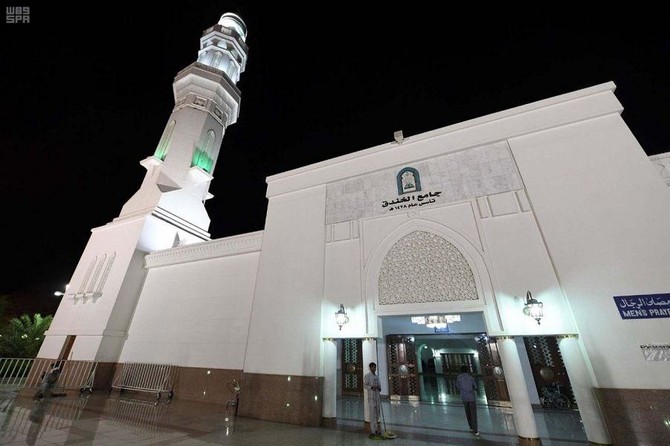
The Khandak Mosque stands in the place where the Khandak Battle took place in 624 between the Muslims of Madinah and the Makkan army, which was attempting to suppress the spread of Islam. (Supplied)
Fought near the Badr wells, it proved to be a decisive victory for the Muslims, highlighting their strength and Prophet Muhammad’s leadership.
Likewise, the Garden of Hazrat Salman Farsi in Madinah is a historic site where Prophet Muhammad planted 300 date palms to free Salman Farsi from slavery. Located near Masjid Quba, the garden remains lush with date palm trees and features a date shop for visitors to enjoy tea amid the greenery.
Meanwhile, the city’s oldest museum, Al-Madinah Museum, highlights Islamic history and the life of Prophet Muhammad through rare artifacts and models of city landmarks.
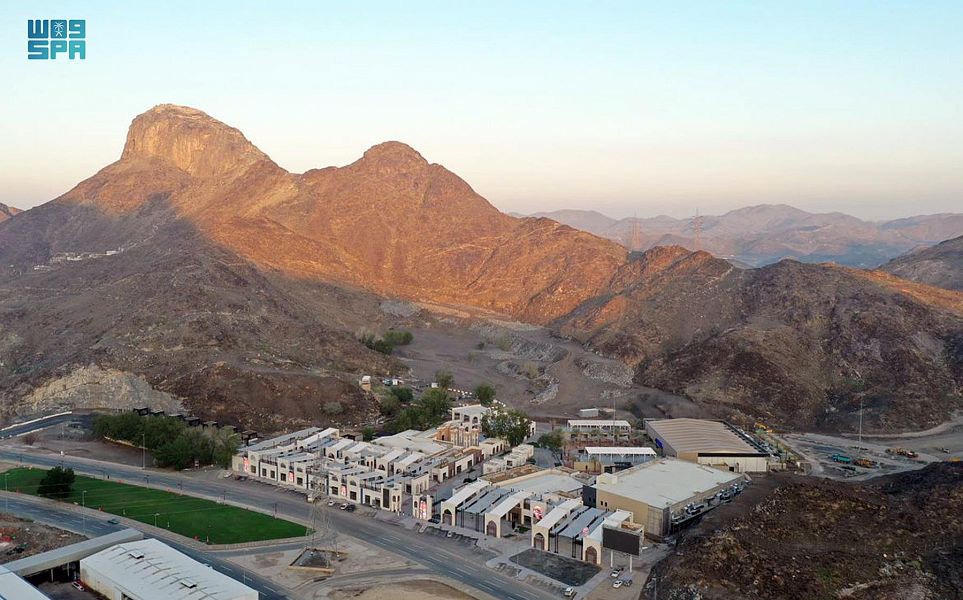
A general view of the Hira Cultural District in Makkah. (SPA)
Similarly, As Safiyyah Museum and Park, located near the Prophet’s Mosque, offers a unique cultural experience with a focus on educational enrichment and enjoyment.
The centerpiece is the Story of Creation Museum, which utilizes advanced technology to visually depict the creation narrative.
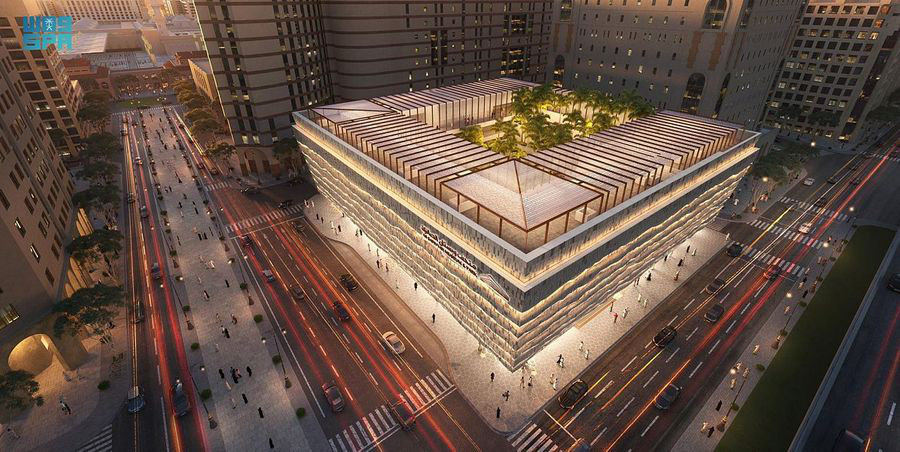
Madinah's Safiyyah Museum and Park, located near the Prophet’s Mosque. (Supplied)
Finally, the Hejaz Railway Museum is housed in the historic railway station and provides insights into the significance of the Hejaz Railway, which was built to facilitate pilgrimages to the holy cities. The museum displays vintage locomotives, historical photographs, and documents detailing the railway’s history.
These sites not only deepen pilgrims’ understanding of Islamic history but also foster a greater appreciation for the rich cultural heritage of the Kingdom of Saudi Arabia.
Through these visits, pilgrims connect with the legacy of their faith, making their pilgrimage a truly holistic journey.



